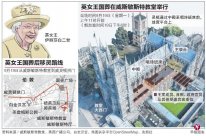(Washington News) The Pentagon of the United States is increasing, prompting the global supply chain of US defense companies to decompose with China.
The Wall Street Journal reports that the US Department of Defense has begun to use artificial intelligence to improve the analysis of the global supply chain of US defense contractors in order to find out whether aircraft components, electronic products and raw materials come from China and other potential opponents.
After lobbying by the Ministry of National Defense with the Ministry of National Defense, the Ministry of National Defense has reduced the use of semiconductor products and special metals from China.
The United States also develops new rare earth mineral treatment facilities in China.At present, most of the rare earth supply in the United States comes from China.
The Ministry of National Defense stopped receiving the F-35 fighter made by Lockheed Martin earlier in September because they learned that these fighters used Chinese alloy components prohibited by US laws and the Ministry of National Defense.
It is reported that the Pentagon has recognized the raw materials and semiconductors provided by China for many years that there may be loopholes in semiconductors, which are particularly prominent during the Trump administration.A number of studies in the Pentagon show that their dependence on China and other overseas suppliers is getting higher and higher.
Pentagon officials said that the epidemic of crown disease reveals the vulnerability of the supply chain, and even high -end weapons are no exception.Some chemical components of explosives.
One of the biggest concerns of the Pentagon and National Defense Industry Leaders is that the United States relies on China's rare earth elements to 80 %.These elements are sometimes called technical minerals, which are used in commercial applications such as magnets and electric vehicle batteries for weapon guidance systems.
The survey by the Govini data analysis company in the United States pointed out that from 2012 to 2019, the number of Chinese companies in the pentagonal supplier list increased by more than five times to 655.



